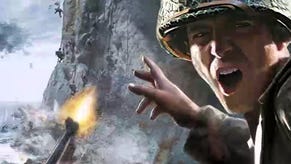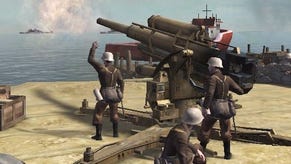Call of Duty 2
John talks to Infinity Ward about its exciting next-generation sequel.
After the recent announcement of a release date for the Xbox 360, it's a pleasure to report that we've had our sticky mitts on one already, and even better, played a selection of levels from the forthcoming PC/360 release, Call of Duty 2.
Anyone who played the previous version of the WWII first-person shooter will need to know nothing more than that it's being developed once again by the same team, and it's following the same formula of multiple chapters playing soldiers from different countries. Short of some inexplicable mass-hysteria at Infinity Ward, and the levels we played being removed and replaced with, who knows, photographs of the developers on the toilet, it appears fairly safe to get your hopes up. Those who did not pick up the PC's Call of Duty, or perhaps were unfortunate enough to have only seen Spark's disappointing console ‘port', will want a bit more convincing. Thank goodness we're here.
We had the good sense to talk to Infinity Ward's president, Grant Collier, and ask him how the development progress has been, and whether being one of the first to develop for a next gen console is a smooth ride.
The cinematic intensity. The large-scale infantry battles, having a hundred a side. The multiple storylines. Different perspectives. Oh, and a really great multiplayer game. We spent a lot of time on CoD1, making sure we had a real streamlined and robust multiplayer. I've played 64-player games of multiplayer CoD, which is amazing. So we wanted to make sure we had that streamlined and rich experience - we wanted to keep that type of clean net code that would support clan gaming for those who want to play competitively.
Some big changes from CoD1 to CoD 2 came from the feedback from consumers. We asked, and they said they didn't necessarily like the style we did for the British campaign - it was solo or with a small squad - and they really liked the Russians and they really liked the Americans. But with the Brits, they felt like they'd already played that game before - they'd already played the one man, Rambo, going through the war single-handedly. Now the British campaign is heavy infantry fighting, and not special ops any more.
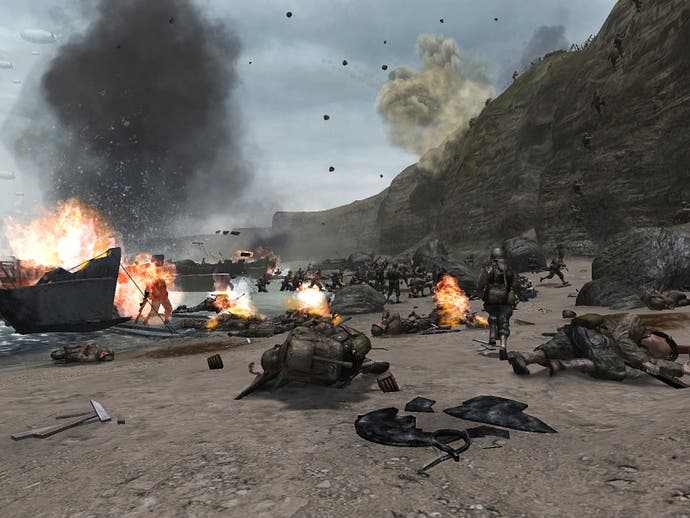
Yeah, we also got together with our military adviser, Hank, and asked him what was missing from CoD1. He said that first off, it's too quiet out there. The guns are blazing, and the planes are flying overhead, but in a battlefield, once the first shot is fired, there's a lot of chatter. We've created a context-sensitive battle-chatter system. They can see their friends and foes, and they're going to call that information out to their allies. "I'm out of ammo." "I'm wounded." "Back me up." The enemies will do the same, relaying information about where you are. The other thing he said was missing was portable concealment, part of warfare for several hundred years.
Portable Concealment is basically smoke. We've created our own proprietary system, no longer using the Quake 3 system, that will allow us to have smoke grenades which are used throughout the game, changing the tactics you use. When explosions go off, it's not just a puff of smoke that appears and is then gone. There will be a brilliant explosion, and then smoke billowing, and smouldering. Adding smoke has so dramatically changed the way the game plays. You'll be having a fire-fight, when suddenly a soldier will throw shit-loads of smoke grenades at you, and all these guys come rushing through the smoke and rifle-butt you down. Heh, melee is very lethal in the game.
When we started designing CoD2, we tasked the designers with taking the experience to the next level. They came back to us saying, "We're going to do non-linear gameplay." We said, "Hey, great idea," and set out to see how we could make the game, and realised that we couldn't use any of the stuff that we'd used before. It was worthless. Before, we always knew where the player was going to be, and there were never going to be any enemies behind you. You followed a little path, and maybe it was a great ride, but the AI always knew where you were, would always point their gun in a certain direction, and certainly didn't need to be as smart as they are now.
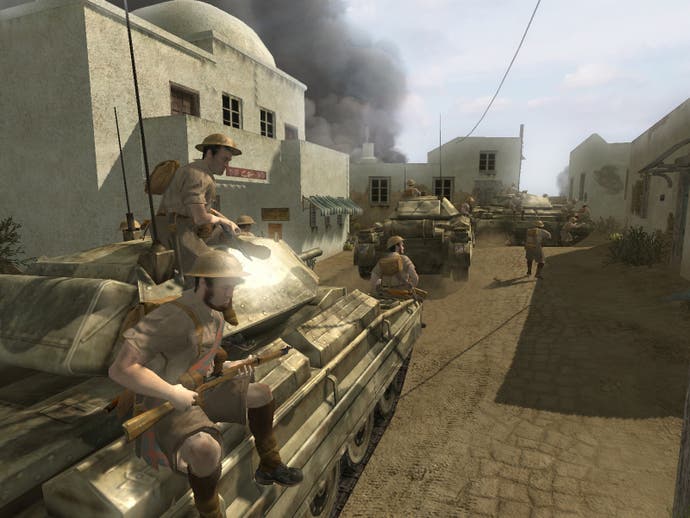
Now they have vision cones and hearing ranges - they're very autonomous. They have extensive knowledge of what can be used as cover, what the level layout is - they need to know everything about the level when they're moving around. When you're attacking the Germans, and they're pressed, they'll fall back and retreat. Then they'll try to set up ambushes. When they move around to flank you, if they come across other friendlies they'll tag them and bring them with. Once they find you, they'll relay that information to their fellow soldiers. If you speak German, you'll hear them say, "They're over here, let's flank them."
You start in 1941 with the Russians, defending Moscow from the Germans. You can move through a story-driven path all the way through the Russian missions, or, as you hit 1942 you unlock the British infantry campaign in North Africa, then in 1943 you open up the British tank commander campaign in N Africa. Then 1944 starts off with the Americans on D-Day. You can jump back and forth through these campaigns, as long as you unlock them chronologically.
We spent a lot of time talking with veterans. From day one, we always wanted to be extremely respectful of what those people went through, the sacrifices they made. It totally shaped the Western world. We've always wanted to talk to the veterans and bring them and, and we have a lot of pride in what we do. We've never once had a veteran tell us that he was ashamed of the fact that we were making this game. That's a real honour. It's been a real honour to tell their story, and to do it in a tasteful fashion.
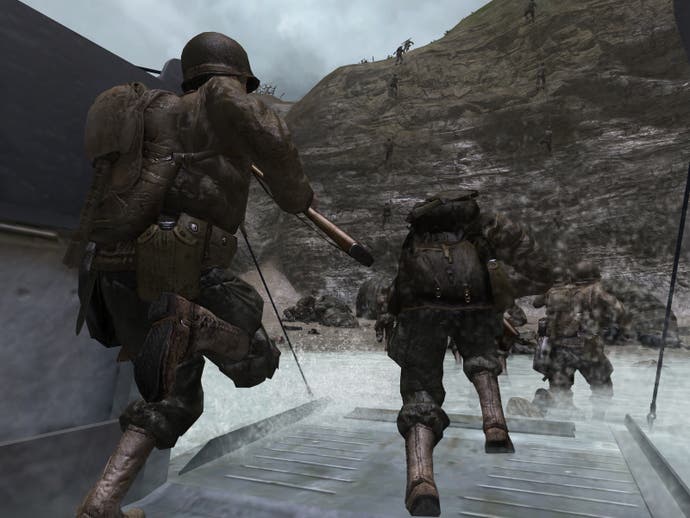
The 360 - it's like this whole new era of gaming. This probably would have been a PC-only title if Microsoft hadn't come to Activision and asked Infinity Ward to do an exclusive for the 360. That was a real honour - we've had a great relationship with them. They've been able to help us out tremendously. But multiple threading - that has been a really challenging thing. I don't want to blow any smoke your way, but it has been challenging.
At IW, we try to tackle the riskiest, most difficult things first. We allocate a certain amount f time in the beginning, and that's when we start beating on that shit, and if it's not working at the end of that time, then we know we're just not going to deal with it and move on. But when we do get it working, we have the entire development period to tweak it and make it better. And the multi-threading stuff, now we have it working, we're running at 60fps on the 360, which is very nice.
Well, I have a real pimped out home entertainment system. I've got a 60 inch plasma screen, and surround sound, and gigantic sub woofer, and it's begging for 5.1 games, and for hi-definition games. The games look so much better than everything else that I'm used to. It really is next generation.
Call of Duty 2 is coming to the PC and Xbox 360 in mid November via Activision; not to be confused with Call of Duty 2: Big Red One for PS2 and Xbox, that we recently previewed.


